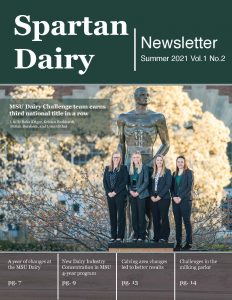Michigan State University is back in session for the fall semester. The dorms are full, campus busses are running and Anthony Hall is bustling for the first time in over a year. While COVID-19 affected many of the day-to-day happenings at the university, it didn’t slow the momentum of finding – and strengthening – dairy’s place at MSU.
“There was a pretty big effort started a few years ago within the animal science department to re-envision the way that we do things. Where can we reinvest, not just in things, but in people and expertise?” Dr. Barry Bradford, MSU C. E. Meadows Endowed Chair in Dairy Management and Nutrition said. “This generated some really thoughtful, long-term plans that led into many changes currently underway.”
As a part of the re-envisioning process, MSU brought stakeholder advisory groups together from the two colleges most influenced by the dairy industry at MSU: the College of Agriculture and Natural Resources and the College of Veterinary Medicine. As a result, MSU’s dairy program is strengthening and adapting to meet today’s industry’s needs.
Modernizing the Curriculum
“The absolute clearest message from both of those efforts was that we need to put out students who have more hands-on, boots-on-the-ground experience,” Dr. Bradford said.
Perhaps there is no better person to spearhead the future of dairy at MSU than Dr. Joe Domecq, long-time mentor, advisor and instructor to MSU Ag Tech dairy students and 4-H dairy youth. Having been at MSU for over 30 years in many roles including coaching dairy judging and dairy challenge teams, and most recently being named MSU Coordinator of Dairy Education, Dr. Domecq has the benefit of recognizing and interpreting the trends of today’s students.
“The type of students that are coming into Ag Tech and animal science or have an interest in dairy today don’t have the industry background and practical experiences that they once had 30 years ago,” Dr. Domecq said. “There aren’t as many farm kids because there just aren’t as many farms. What we are seeing is a real lack of practical hands-on experiences and we were hearing it from stakeholders, alumni and former students that recent graduates don’t always know what’s going on in a modern dairy operation.”
The solution to the problem at hand was to develop a dairy concentration within the animal science major. Students interested in dairy can now pursue dairy focused classes and graduate with dairy mentioned on their diploma. The new concentration also created additional, more advanced dairy-related classes at MSU to complete the curriculum.
“The four-year animal science students are now going to take more hands-on classes and the two-year students that want to transfer to a four-year animal science degree can transfer easily and receive more advanced classes in science and in dairy production,” Dr. Domecq said. “The new curriculum should benefit both groups of students.”
In addition to the changes in curriculum, Dr. Domecq will also now not only be advising the two-year Ag Tech dairy management students, but also the four-year students pursuing the dairy concentration. This change will allow two-year students to transfer more fluidly to pursuing a four-year degree and 4-year students gain practical insights and guidance into the dairy industry. The modern approach to refreshing the curriculum and servicing today’s students continues to play on MSU’s strengths, but humbly recognizes where improvement can be made.
“I think we have traditionally done a great job teaching students about the science of cows, for example, teaching about amino acids in dairy nutrition or hormones involved in cow reproduction,” Dr. Domecq said. “But if they’ve never mixed a TMR, understand feeding management, performed artificial insemination or utilized dairy software programs to analyze dairy performance, what good does it do to know about the amino acids and hormones?”
These hands-on classes will ensure that graduates of MSU’s animal science dairy concentration can connect the dots between the science, business and the farm. Dr. Domecq and Dr. Bradford agree that building that connection can be transformational for the dairy industry over time.
“Michigan’s dairy industry won’t be transformed overnight by the addition of these new classes, but the real impact comes when you’re doing a better job with training,” Dr. Bradford said. “Students who understand not just the fundamental science, but also the application of it are going to have a huge impact over their careers and a massive 10-, 20-, 30-year impact.”
Keeping in Touch with the Industry
Along with revamping the dairy curriculum, another way to make an impact on Michigan dairy farms is to improve communication between the college and the dairy industry.
“As a college, we have a really vital role in keeping the connection with the industry so that we can communicate the things that we’re doing,” Dr. Catherine Ernst, MSU Animal Science Department Chair said. “And it goes both ways because then we can learn where
some of the bottlenecks are and what questions the industry needs answered.”
Spearheading the effort to improve the collaboration between MSU experts and influential dairy leaders is Dr. Bradford.
“I consider it my job to know all the people internally that could be of service to dairy farms,” Dr. Bradford said. “And then to get out and really know a lot of people in the industry so that they feel comfortable calling me and sharing what they’re dealing with, and I can help direct them to the right people.”

Dr. Bradford’s connections in the industry led him to revisiting the historical Michigan Dairy Review, a publication overseen by Dr. Dave Beede, published for over a decade.
“One of the things we really tried to do in the last year was to re-envision a more graphic intensive version of the Michigan Dairy Review,” Dr. Bradford said. “Something that has a lot of technical pieces, but also has spotlights on people because it is still a people business. We want people to know who’s out there at Michigan State University, and also out there in the industry.”
The refreshed Michigan Dairy Review, now called the Spartan Dairy Newsletter, is mailed, emailed and published online. Going even more digital, MSU dairy resources, events and news is now shared on Facebook, Twitter, LinkedIn and YouTube. These efforts are part of Dr. Bradford’s goal of moving towards better networking within Michigan’s dairy industry and another result of him listening to feedback from industry members.
“There are some great thinkers out there in the industry and getting their input on how we can better serve them is fantastic,” Dr. Bradford said. “Although very few people take me up on it, I always say that critical feedback is welcomed and actually appreciated.”
Transforming the Future
While all of these changes are going to positively impact the industry in due time, Dr. Domecq, Dr. Bradford, Dr. Ernst and the entire College of Agriculture and Natural Resources at MSU aren’t done yet. Transformation takes time and continual tweaking to get it right.
“We will continue to be flexible and dynamic, striving to deliver the best education for students possible while continuing to stay at the cutting edge of research and translating that research into practice through our outreach and extension activities,” Dr. Ernst said. “We are always trying to move that frontier forward, not stay status quo and be transformational.”
This article was originally published in the September/October 2021 issue of the Milk Messenger. Subscribe »

